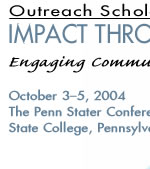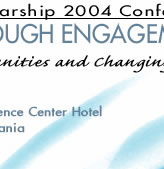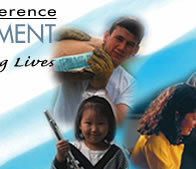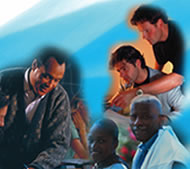|
Opening-Day
Highlights
Morning
Preconference Workshops
Evaluation
of outreach scholarship is based on context-driven characteristics
that vary at each institution. The framework for evaluating
outreach scholarship should accommodate institutional
contexts, the breadth of faculty work, and institutional
promotion and tenure guidelines. The Clearinghouse and
National Review Board for the Scholarship of Engagement
has established criteria for assessing and evaluating
the scholarship of engagement. This workshop is designed
for faculty, department heads, promotion and tenure
committee members, faculty senators, deans, provosts,
and presidents. Institutions are invited to bring faculty
teams to participate in this workshop.
|
 |
|
Kevin
P. Reilly
|
Engagement
and Controversy: The Professional Roles of Outreach
Faculty and Staff
Kevin P. Reilly, Chancellor, University
of Wisconsin-Extension, with a panel of University of
Wisconsin-Extension faculty and staff
If
the university's public mission involves being engaged
in meaningful ways to address society's most pressing
concerns, it will inevitably result in some level of
controversy or, at a minimum, discomfort (on someone's
part!). This panel will present the early results of
a University of Wisconsin-Extension initiative aimed
at defining the professional roles of outreach faculty
and staff when engaged in controversial issues. It will
share the results of a year's worth of lively and important
discussion about this issue from the perspective of
seven academic departments and a public radio and public
television organization.
|
|
|
Kathryn
Brasier
|
|
|
|
Tim
Collins
|
|
|
|
Timothy
Kelsey
|
Engaging
the Community about the Future of Agriculture
Kathryn Brasier, Assistant Professor of
Rural Sociology, Penn State Cooperative Extension
Tim Collins, Community Development Educator,
Penn State
Timothy Kelsey, Professor of Agricultural Economics,
Penn State
The
Future of Agriculture program is a community-based program
addressing the needs and future of farming in a county
or region and based on the idea that agricultural concerns
cannot be solved solely by farmers. The community itself--including
a broad range of groups, such as local government officials,
local economic development councils, chambers of commerce,
land trusts, and others--must play an active role. The
program helps the community identify the concerns and
barriers to survival and growth facing local farms.
This example of outreach scholarship develops and implements
a community-based plan for sustaining farms and farming.
This session will provide an overview of the Future
of Agriculture program and its link to outreach scholarship
activities, with a particular focus on overall program
impact.
Evaluation of outreach scholarship is based on context-driven
characteristics that vary at each institution. The framework
for evaluating outreach scholarship should accommodate
institutional contexts, the breadth of faculty work,
and institutional promotion and tenure guidelines. The
Clearinghouse and National Review Board for the Scholarship
of Engagement has established criteria for assessing
and evaluating the scholarship of engagement. This workshop
is designed for faculty, department heads, promotion
and tenure committee members, faculty senators, deans,
provosts, and presidents. Institutions are invited to
bring faculty teams to participate in this workshop.
|
|
|
Anthony
Atchley
|
|
|
|
Fred
Vondracek
|
|
|
|
Lorilee
Sandmann
|
|
|
|
John
Mason
|
Evaluating
and Documenting Outreach Scholarship: Framing the Scholarship
of Engagement at Your Institution
Lorilee Sandmann, Co-director of the Clearinghouse
and National Review Board for the Scholarship of Engagement,
and Associate Professor of Adult Education, The University
of Georgia
John Mason, Associate Dean for Outreach, College
of Engineering, Penn State
Anthony Atchley, Professor of Acoustics and
Chair of the Graduate Program in Acoustics, Penn State
Fred Vondracek, Associate Dean for Outreach,
College of Health and Human Development, Penn State
This
workshop will provide an opportunity for participants
to review and critique the standards for quality of
outreach engagement at their institutions. Teams will
review the criteria used to evaluate scholarly work
by faculty, and guidelines for documenting and evaluating
scholarly engagement for promotion and tenure purposes.
Participants will be able to compare standards that
have been established by a number of disciplines--in
particular, engineering and health.
|





